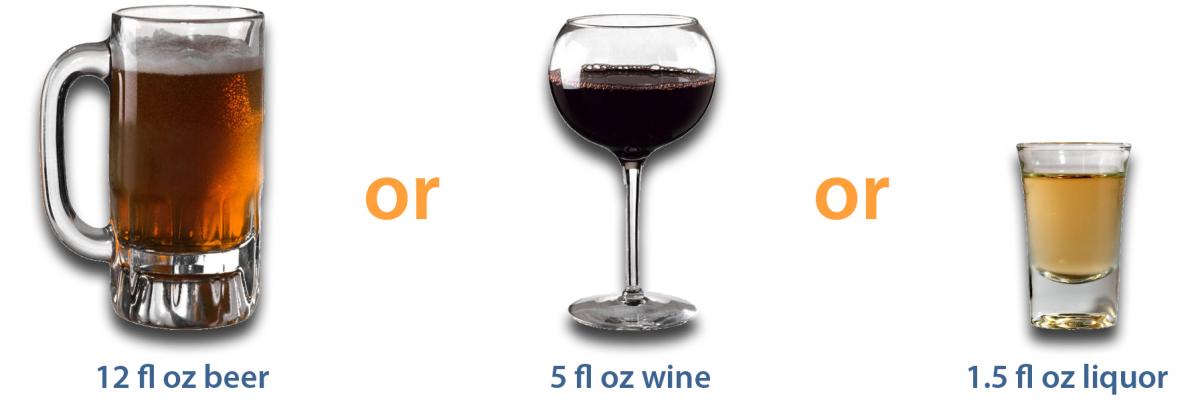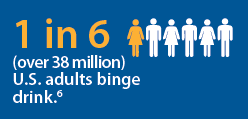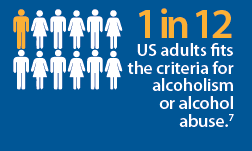You are here
Alcohol Use and Abuse: What You Should Know
Drinking alcoholic beverages is often seen as a way to relax, socialize or celebrate, but drinking too much or drinking as a way of dealing with feelings of anxiety or depression has negative consequences.
How much is “a drink”?
The amount of liquid that is considered “a drink” depends on the type of alcohol being consumed. The National Institute on Alcohol Abuse and Alcoholism defines the following as one standard drink1:

It is advised that men consume no more than 4 drinks in a single day and no more than 14 drinks total in a week. Because women’s bodies process alcohol differently, they should consume no more than 3 drinks in a single day or 7 drinks total in a week.2 These are only rough guidelines. Pregnant women, people under the age of 21 or people with health conditions or medications that interact with alcohol should not drink alcohol.
Effects of Alcohol
Alcohol has many widely known short and long term effects. In the short term, after changes in mood and decreased inhibition have passed, one may experience a hangover. Hangovers often include feelings of dehydration, a sense of mental fogginess, headache and nausea. In the long term, heavy alcohol use can lead to serious organ damage and memory problems. Here are some other effects of alcohol that you may not be as familiar with:
- While alcohol may cause some people to be able to fall asleep more quickly, it decreases the quality of sleep by interfering with REM.3 REM (rapid eye movement) is a part of the sleep cycle when dreams occur, and is thought to be the most restorative stage of sleep. If REM sleep is disrupted you may feel tired and unable to concentrate the next day.
- Alcohol alters serotonin levels in the brain.4 Serotonin is a neurotransmitter, or chemical, used by the brain to regulate mood, and imbalances in serotonin are thought to cause mental health conditions like depression, anxiety and obsessive compulsive disorder.
Types of Problem Drinking
Heavy Drinking: When someone consumes more than the daily or weekly guideline amounts for alcohol.2
Binge Drinking: When excessive amounts of alcohol are consumed in a short period of time, resulting in a spike in blood alcohol content (For example, a man who has 5 drinks in 2 hours, or a women who has 4 drinks during that time).5 People who binge drink are especially prone to “blackouts” or lapses in memory.
Alcoholism: Also known as alcohol dependence, is a disorder characterized by an uncontrollable urge to drink, inability to stop drinking once started, need to drink more and more to feel the effects (tolerance), and withdrawal symptoms if one does not consume alcohol. Withdrawal symptoms can include anxiety, sweating, nausea or shakiness.
 |
 |
Are You Abusing Alcohol?
Here are some questions to ask yourself about your use of alcohol. If you answer “yes” to most of them, then you’re likely using too much:
- Is your personality different when you drink?
- Do you drink to gain courage to face social situations?
- Has your drinking ever caused you to miss work or other appointments?
- Do you use alcohol to escape problems when you are upset?
- Is it hard for you to stop drinking after you have one or two drinks?
- Do you always end up drunk, once you start drinking?
- Have you tried, and failed, to drink less alcohol or drink none at all?
- Do you sometimes have trouble remembering what you did while under the influence of alcohol?
- Do you regret doing some of the things you’ve done under the influence?
- Have friends or family members tried to express their concern about your drinking?
- Has your work suffered because of your drinking?
- Have you needed a drink in the morning to get going after a night of heavy drinking?
Getting Help
If you need help dealing with your drinking or drug use, try contacting your employer’s EAP (employee assistance program) and/or primary care doctor. You may also find assistance by using the Substance Abuse and Mental Health Services Administration’s Substance Abuse Treatment Facility Locator online at http://findtreatment.samhsa.gov/TreatmentLocator.
In addition to those services and the organizations listed below, ask friends and family for help and support. Most people who care about you will be glad to support your efforts to reduce your drinking or drug use.
- National Council on Alcoholism and Drug Dependence: www.ncadd.org
- Alcoholics Anonymous: www.aa.org
- Women for Sobriety: www.womenforsobriety.org
- Recovery.org: www.recovery.org
- National Institute on Alcohol Abuse and Alcoholism: www.niaaa.nih.gov
Sources
1National Institute of Alcohol Abuse and Alcoholism. “What is a Standard Drink.” Retrieved from http://www.niaaa.nih.gov/alcohol-health/overview-alcohol-consumption/standard-drink
2National Institute of Alcohol Abuse and Alcoholism. “Overview of Alcohol Consumption,” Retrieved from .http://www.niaaa.nih.gov/alcohol-health/overview-alcohol-consumption/moderate-binge-drinking
3Ebrahim, I. O., Shapiro, C. M., Williams, A. J. and Fenwick, P. B. (2013), Alcohol and Sleep I: Effects on Normal Sleep. Alcoholism: Clinical and Experimental Research, 37: 539`–549. doi: 10.1111/acer.12006
4Lovinger, David M., (1993) Serotonin’s Role in Alcohol’s Effects on the Brain. National Institute on Alcohol Abuse and Alcoholism. Retrieved from http://pubs.niaaa.nih.gov/publications/arh21-2/114.pdf
5National Institute of Alcohol Abuse and Alcoholism. NIAAA council approves definition of binge drinking [PDF-1.62MB]. NIAAA Newsletter 2004; No. 3, p. 3.
6http://www.cdc.gov/vitalsigns/BingeDrinking/index.html
7National Institute on Alcohol Abuse and Alcoholism. (2007). “FAQs for the general public.”








this page